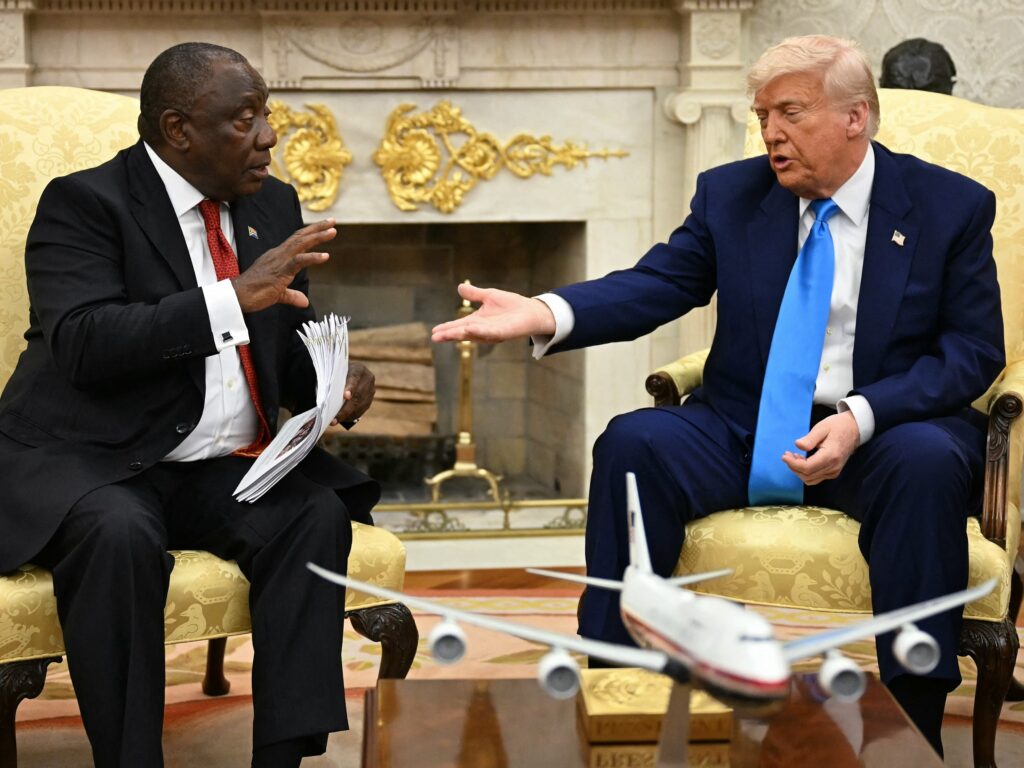Tensions Rise as Trump Confronts Ramaphosa in Divisive Meeting
In a politically charged atmosphere, former U.S. President Donald Trump recently engaged South African President Cyril Ramaphosa during a contentious meeting in the Oval Office. The encounter, described by some as an ambush, brought to light the deep-seated divisions within South African society, particularly surrounding issues of race and crime.
Trump, seen by many as a champion of right-wing Afrikaner factions, received commendations from groups like the Solidarity Movement. They hailed his efforts to highlight perceived crises faced by Afrikaners in South Africa, with one prominent figure, Ernst Roets, exclaiming on social media, “Donald Trump made history today.” This sentiment was echoed by Jaco Kleynhans, who suggested that Trump should receive a Nobel Prize for bringing the issue of farm attacks to global attention.
Ramaphosa’s Calm Approach
Facing Trump’s claims of persecution directed at white farmers, Ramaphosa maintained a composed demeanor throughout the meeting, stating, “South Africa is a democracy.” He acknowledged the challenges posed by crime while emphasizing that the Economic Freedom Fighters (EFF) party, which promotes radical policies including land nationalization, remains part of the democratic fabric of South African politics.
As frustrations simmer across the nation, many South Africans expressed anger toward right-wing groups accused of seeking foreign intervention to further their agendas. Critics argue that the portrayal of South Africa as a land under siege ignores the wider context of a multi-racial government that aims to address the country’s myriad socio-economic challenges.
The Reaction from Both Sides
Amongst Ramaphosa’s advisers was John Steenhuisen, a prominent figure within the Democratic Alliance, South Africa’s second-largest political party. Steenhuisen underscored the need for international support to overcome the country’s pressing issues. “This government needs the support of our allies around the world to strengthen our hand,” he remarked during the meeting.
The discussion turned to crime rates, with both sides acknowledging the serious safety concerns impacting all citizens, regardless of race. Steenhuisen challenged the narrative that white farmers are overwhelmingly abandoning their land, asserting, “Most farmers want to stay and make it work.” This brings to light the complexities of the socio-economic landscape in South Africa, where the struggle for security transcends racial lines.
Mixed Responses from South Africans
The diverging opinions about Trump’s accusations highlight the polarized environment in South Africa. While some Afrikaners feel a sense of despair about their future in the country, many citizens continue to champion the values of unity and reconciliation. The meeting, described by Land Reform Minister Mzwanele Nyhontso as “uncomfortable to watch,” sparked reflection on the real challenges facing everyday South Africans.
Additionally, high-profile figures like billionaire businessman Johann Rupert drew attention to the rampant violence in the country’s townships, which predominantly affects marginalized communities. Trade unionists, such as Zingiswa Losi, further emphasized that the issue is not only about race but primarily centers on crime and poverty affecting millions.
| Issue | Details |
|---|---|
| Crime Rates | High crime is a concern for all South Africans, regardless of race. |
| Political Landscape | South Africa has a coalition government aiming to address systemic issues. |
| International Attention | Trump’s comments have sparked global discussions on race relations in South Africa. |
As Ramaphosa pointed out, the pressing need for national unity remains paramount in overcoming the challenges facing South Africa. The encounter with Trump, while polarizing, may serve as a catalyst for critical discourse on how to address the country’s sociopolitical complexities.


